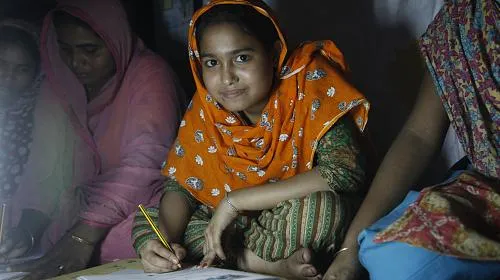DHAKA (Jan. 23, 2017) – The leading global poverty-fighting organization CARE joins partners in expressing concern regarding a new legal measure proposed by the government of Bangladesh that would allow girls under the age of 18 to marry in “special cases” with parental and judicial consent. The Bangladeshi Parliament will be considering the new provision in the coming weeks as part of a new draft law known as the Child Marriage Restraint Act 2016.
Under the existing law in Bangladesh, the legal minimum age of marriage is 18 for women and 21 for men. If adopted under the new Child Marriage Restraint Act, the special provision would be a major step backward for Bangladesh, which has made significant strides toward ending child marriage over recent years. The proposed special provision reportedly provides no minimum age of marriage and does not define the type of “special cases” under which marriage under 18 is allowed. Statements from the Prime Minister indicate that this provision would be used in “special cases,” such as “accidental” or “illegal” pregnancy, or where a marriage would protect a girl’s “honor.” However, there are fears that this special provision would leave the new law open to abuse and further encourage the practice of child marriage in a country with one of the highest child marriage rates in the world. While progress toward ending child marriage has been made in Bangladesh, the country still has the highest rate of child marriage in Asia with 52 percent of girls married by the age of 18.
CARE commends the Bangladeshi Government’s concern for adolescent girls and for attempting to improve their lives. However, we urge the Prime Minister and Members of Parliament to maintain the minimum age of marriage at age 18 for girls without exceptions. Research indicates that countries where 18 is the minimum legal age of marriage without exception have child marriage rates 40 percent lower than countries with lower minimum ages, or that have exceptions in the law. In response, many countries are working to amend legislative frameworks that allow marriage before 18.
Evidence from CARE’s work in Bangladesh and other countries highlights the negative consequences of child marriage on the rights, health and wellbeing of girls and their families. “Our experience shows that early marriage – rather than protect girls – disempowers them and perpetuates the vicious cycle of poverty,” said Kaiser Zillany, team leader of CARE’s Tipping Point project in Bangladesh, an initiative which addresses the root causes of child marriage and supports alternative options for girls. “Child brides are more likely to experience early and frequent pregnancies, drop out of school and be deprived of educational and economic opportunities that can help lift them and their communities out of poverty.” Indeed, global evidence shows that complications in pregnancy and childbirth are among the leading causes of death in girls aged 15-19 in low- and middle-income countries.
The Bangladesh government has made important strides toward ending child marriage, including commitments made under the Kathmandu Call for Action to End Child Marriage in South Asia and at the 2014 Girl Summit in London. CARE expresses concern, however, about the consequences of this new provision, joining in solidarity with Bangladeshi civil society organizations in their call to withdraw the provision and enter into a dialogue on how such “special cases” can be managed without undermining the rights and future of thousands of girls.
ABOUT CARE: Founded in 1945, CARE is a leading humanitarian organization fighting global poverty. CARE places special focus on working alongside poor girls and women because, equipped with the proper resources, they have the power to lift whole families and entire communities out of poverty. Last year, CARE worked in 94 countries and reached more than 80 million people around the world. To learn more, please visit www.care.org.
Media Contacts: Nicole Ellis, +1-202-560-1791, nicole.ellis@care.org

